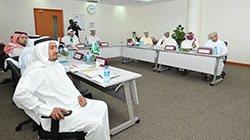

At the end of the 16th periodic meeting of the institutes' officials of public administration and administrative development in the Gulf Cooperation Council (GCC), the participants recommended the need to develop a unified general framework among the GCC countries to develop skills of leaders in government agencies, and the necessity to find a vision for the development of administrative leaders in the government sector different from the private sector, in addition to developinga methodology for assessing leaders in the public sector, through improving of standards and principles related to governance and its bases.
During the 2-day meeting, which was held in the premises of the Institute of Public Administration, and concluded its work on Tuesday, the importance of qualifying second row of high experienced administrative leadersin government agencies was stressed, and emphasizedalso on the work to develop training programs for administrative leaderships, beyond bureaucracy, to be an outstanding performance program, as well as the need to benefit from the expertise and successful experiences of the GCC countries in the development of the administrative work, and choosing the administrative work in the government sector.
The first day included providing presentation concerning the working paper of the UAE, Bahrain and the Saudi Arabia, where the UAE delegation discussed the general framework for the management of distinctive competencies in the UAE's federal government – UAE Government leaders program, Bahrain's paper was presented by the executive director of leadership development program at the Institute of Public Administration Mr. IshacAmeen,who sought to explain the strategies for developing leadership capabilities in the public sector, in additionto the working paper of the Saudi delegation which dealt with theexperience of the Institute of Public Administration in the Kingdom of Saudi Arabia in training activities and events directed to develop the capacities of administrative leadership in the government sector.
The second day started with presenting a working paper submitted by the Institute of Public Administration in the Sultanate of Oman on buildingleadership capacities through training: results-based approach, while Qatar'sInstitute of administrative developmentparticipation was centeredaround assessing the effectiveness of leaders in the public sector from the perspective of governance, in addition to the Kuwait's civil service bureau paper which was concentrated on recruitment, selection and planning forjob replacementin public sector.
The meeting then concluded by the Deputy Director of Human Resources, Mr. Waleed Al-Hamoud of the General Secretariat of the Gulf Cooperation Council (GCC), through reviewing the findings and recommendations that have been agreed uponconcerningbuildingleadership capacities forgovernance in public sectorin the institutes of public administration and administrative development in the GCC countries.
It is worth mentioning that this regular meeting came as an implementation of an item in the 13th meeting of the general managers of institutes of public administration and administrative development in the Gulf Cooperation Council (GCC) countries in Riyadh last year, which aimedforthe necessity to take advantage of the leadingexperiences and practices in the administrative areaof the GCC countries.
